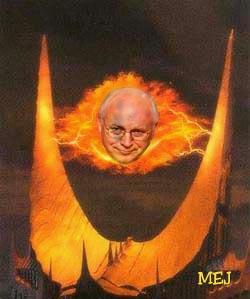
Almost a year ago I had a
post on Hillary Clinton's neocon leanings and then
on Sunday I discussed Hillary's refusal to concede she was wrong when she voted for the Iraq war resolution and sounding a lot like George W Bush, refusing to take responsibility. That is the Subject of Paul Krugman's column today,
Wrong Is Right.
Many people are perplexed by the uproar over Senator Hillary Clinton’s refusal to say, as former Senator John Edwards has, that she was wrong to vote for the Iraq war resolution. Why is it so important to admit past error? And yes, it was an error — she may not have intended to cast a vote for war, but the fact is the resolution did lead to war; she may not have believed that President Bush would abuse the power he was granted, but the fact is he did.
The answer can be summed up in two words: heckuva job. Or, if you want a longer version: Medals of Freedom to George Tenet, who said Saddam had W.M.D., Tommy Franks, who failed to secure Iraq, and Paul Bremer, who botched the occupation.
For the last six years we have been ruled by men who are pathologically incapable of owning up to mistakes. And this pathology has had real, disastrous consequences. The situation in Iraq might not be quite so dire — and we might even have succeeded in stabilizing Afghanistan — if Mr. Bush or Vice President Dick Cheney had been willing to admit early on that things weren’t going well or that their handpicked appointees weren’t the right people for the job.
The experience of Bush-style governance, together with revulsion at the way Karl Rove turned refusal to admit error into a political principle, is the main reason those now-famous three words from Mr. Edwards — “I was wrong” — matter so much to the Democratic base.
The base is remarkably forgiving toward Democrats who supported the war. But the base and, I believe, the country want someone in the White House who doesn’t sound like another George Bush. That is, they want someone who doesn’t suffer from an infallibility complex, who can admit mistakes and learn from them.
As
John Avarosis said, after six years of George W Bush's refusal to admit mistakes and refusal to take responsibility
"It worked for six years, but now people are seriously over the "I'm wrong, but resolute" personality type."
But as Krugman points out there is even more.
And there’s another reason the admission by Mr. Edwards that he was wrong is important. If we want to avoid future quagmires, we need a president who is willing to fight the inside-the-Beltway conventional wisdom on foreign policy, which still — in spite of all that has happened — equates hawkishness with seriousness about national security, and treats those who got Iraq right as somehow unsound. By admitting his own error, Mr. Edwards makes it more credible that he would listen to a wider range of views.
In truth, it’s the second issue, not the first, that worries me about Mrs. Clinton. Although she’s smart and sensible, she’s very much the candidate of the Beltway establishment — an establishment that has yet to come to terms with its own failure of nerve and judgment over Iraq. Still, she’s at worst a triangulator, not a megalomaniac; she’s not another Dick Cheney.
While she may not be another Dick Cheney her ties to the corporatist neocon soft DLC. The DLC often seems to be as arrogant as the Bush/Cheney cabal and Hillary often seems to share that.
But back to Mrs. Clinton’s problem. For some reason she and her advisers failed to grasp just how fed up the country is with arrogant politicians who can do no wrong. I don’t think she falls in that category; but her campaign somehow thought it was still a good idea to follow Karl Rove’s playbook, which says that you should never, ever admit to a mistake. And that playbook has led them into a political trap.
FAIR USE NOTICEThis article contains copyrighted material, the use of which has not always been specifically authorized by the copyright owner. I am making such material available in my efforts to advance understanding of democracy, economic, environmental, human rights, political, scientific, and social justice issues, among others. I believe this constitutes a 'fair use' of any such copyrighted material as provided for in section 107 of the US Copyright Law. In accordance with
Title 17 U.S.C. Section 107, the material in this article is distributed without profit for research and educational purposes.







